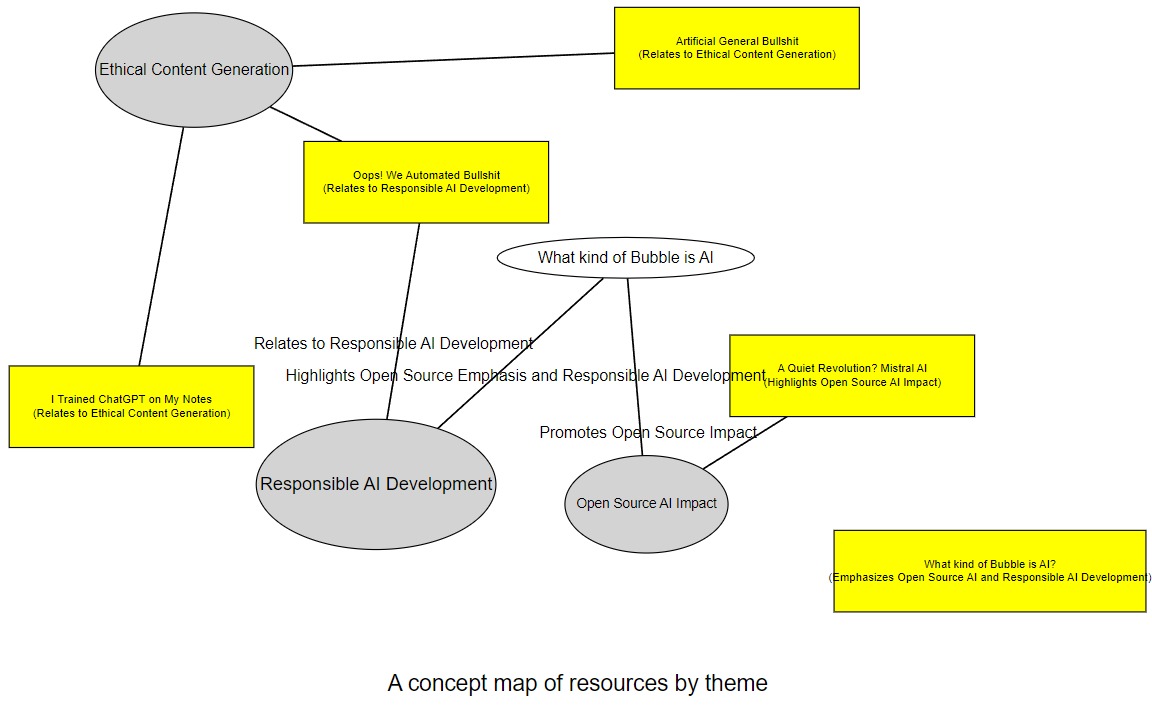This is extracted from C-10-fullnotes-response-gpt35, part of experiment 10.
Title: Navigating the Challenges of Widespread AI Adoption with Open Source AI
! Introduction
Introduction
The rapid proliferation of Artificial Intelligence (AI) in our lives brings immense promise and unprecedented challenges. AI-powered systems have revolutionized industries, from natural language processing to autonomous vehicles, but they also pose significant risks. In this blog post, we delve into the challenges and risks associated with widespread AI adoption and explore how open source AI, exemplified by Mistral AI, can serve as a powerful solution to mitigate these concerns.
Challenges in AI-generated Content
The rise of AI-generated content presents a multifaceted challenge. As discussed in "Oops! We Automated Bullshit," AI systems like ChatGPT can produce text that sounds persuasive but lacks intelligence or accuracy. This challenge stems from the inherent nature of these systems, as noted by MIT Professor of AI Rodney Brooks, who stated that ChatGPT "just makes up stuff that sounds good." In essence, AI-generated content can be misleading, biased, or factually incorrect.
Ethical Content Generation
The importance of ethical content generation cannot be overstated. In "Artificial General Bullshit," Jeff Jarvis highlights that responsible AI development involves ethical considerations. AI applications must adhere to ethical guidelines to avoid misinformation and ensure content aligns with societal norms and values. This is particularly relevant as AI-generated content becomes more integrated into our daily lives.
Responsible AI Development
The development of AI systems should be approached responsibly. In "What kind of Bubble is AI?," the article explores the potential consequences of an AI bubble, emphasizing the risks associated with over-reliance on tech giants like Google and Facebook. It calls for responsible AI development practices that promote diversity, innovation, and transparency, reducing dependency on a handful of corporate entities.
The Role of Open Source AI: Mistral AI
In the midst of these challenges and risks, open source AI models offer a promising solution. One remarkable example is Mistral AI. Mistral AI, often compared to GPT-4, boasts a context size of 32k tokens and utilizes a "Mixture Of Experts" model. This model combines several highly specialized language models, each with seven billion parameters.
Transparency and Accountability
Open source AI models like Mistral AI provide transparency into their algorithms and architectures, addressing concerns of content generation opacity. This transparency empowers users to understand how content is generated, identify biases, and scrutinize the model's inner workings. Users gain confidence in content generated by models they can inspect.
Customization and Control
Customizability is a pivotal advantage of open source AI models. Users can fine-tune these models to suit specific use cases and domains. This level of control enables users to shape AI behavior, reducing the risk of generating misleading or inappropriate content. Open source AI puts control in the hands of users, allowing them to tailor AI's output to their needs.
Community Oversight and Ethical Guidelines
Open source AI projects often foster active communities that collaborate to maintain and improve the models. These communities provide oversight and review of AI-generated content, helping identify and address issues related to misinformation or biased content. Ethical guidelines can be established within these communities to ensure that generated content adheres to ethical standards, as highlighted in "Artificial General Bullshit."
Diverse Data Sources
To mitigate biases, open source AI models can be trained on diverse and representative datasets. Exposure to a wide range of perspectives and information sources makes these models less prone to producing biased content. The article "What kind of Bubble is AI?" emphasizes the importance of diverse data sources in responsible AI development.
Community Feedback and Iteration
Open source AI models can incorporate feedback from the user community. Users play an active role by reporting issues, errors, or instances of problematic content. Developers can then make improvements and refine the model's behavior over time. This iterative process enhances the model's accuracy and reliability.
Reduced Dependency on Tech Giants
One of the critical advantages of open source AI, highlighted in "What kind of Bubble is AI?," is the reduced dependency on tech giants. Open source AI offers alternative solutions to proprietary AI systems, diversifying AI development and content generation. This reduces vulnerability to changes in corporate environments and promotes innovation.
Conclusion
The challenges and risks associated with widespread AI adoption are substantial but not insurmountable. Open source AI models, exemplified by Mistral AI, offer a promising path forward. Through transparency, customization, community oversight, and adherence to ethical guidelines, open source AI fosters responsible AI development and content generation.
As AI continues to shape our world, responsible AI deployment becomes imperative. Let us embrace open source AI as a beacon of accountability and ethics in the AI revolution. By doing so, we can harness AI's transformative power while minimizing risks, ensuring that AI-generated content aligns with our ethical and societal values. Open source AI is not just a technological advancement; it's the cornerstone of a more responsible and ethical AI future.